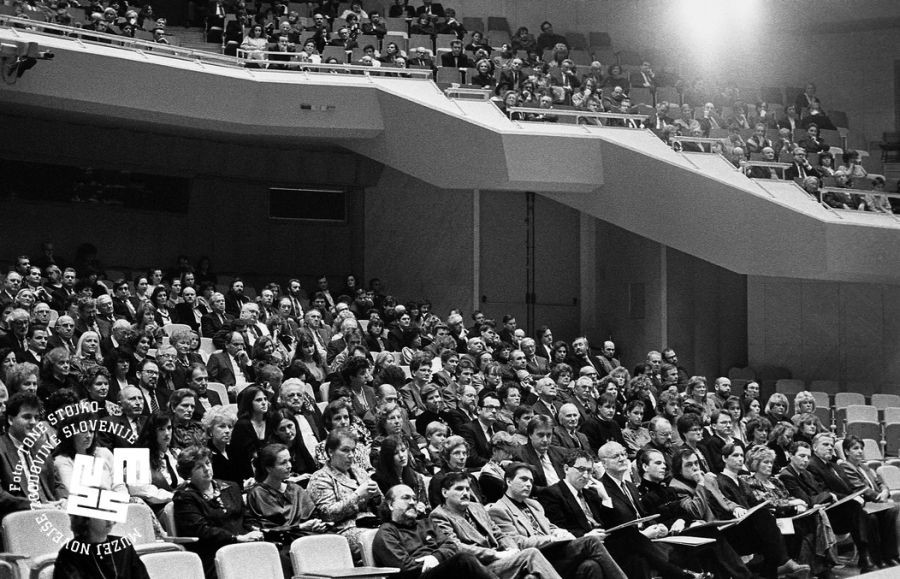1991 Prešeren Award Winners
The creations of these top-notch artists have permanently enriched the Slovenian cultural landscape. Their contributions to the Slovenian cultural heritage have been further highlighted in the three decades since. On the occasion of the 30th anniversary of Slovenia's independence, we will once again remember the Prešeren Award winners from this turning point in the history of Slovenian culture and society.
Composer Jakob Jež was born on 23 November 1928 in Boštanj. He graduated from the Academy of Music in Ljubljana in 1954. The research he conducted at the Academy and afterwards focused mainly on studying the life and work of composer Marij Kogoj. As a researcher, he was continually fascinated by Kogoj's work. He collected, complemented and revised Kogoj's art songs and piano pieces, while also developing his own composing style. While he was introduced to the basics of composing by professors Marijan Lipovšek and Karol Pahor, Kogoj's influence was crucial in forming Jež's proper musical language. The Yugoslav Music Lexicon described his musical style as "a modern and contemporary language, with an intimate expressiveness, a developed sense of colour, lyrics and loose structures."
For many years, composer Jakob Jež worked as a teacher in a music school and lower grammar school in Ljubljana, where he passed on his passion for musical creations to younger generations. In the years preceding his retirement, he worked as a full professor of music education at the Ljubljana Faculty of Education. He was also the editor of the music magazines Grlica (1968–1988) and Naši zbori (1991–1998), and the editor of the Skladatelj bulletin (1967–1970). He received several awards for his lifelong work as a composer and the 2004 Kozina Award for choral works bestowed by the Society of Slovene composers.
The Slovenian painter Anton Zoran Mušič was born in 1909 in the Karst. The Karst landscape is one of his primary themes. The reason he liked to evoke this theme is also because his life had taken him from Venice to Paris, where he spent the main part of his creative life, and then back to Venice, where he died in 2005.
On the occasion of the exhibition of his work at the Museum of Modern Art in 2009, the exhibition curator Breda Ilich Klančnik wrote:
"Mušič's Little Horses, small canvases for the most part, became quite popular with collectors, but the series We Are Not the Last, started in 1970, literally shocked the expert art community. The few surviving drawings from Dachau, which the artist had kept in a drawer in his studio, and a quarter century of suppressed memories of hell found a stirring echo in a series of graphic prints and oil paintings of piles of the Dachau dead. The more recent tragic events that produced new dead belied the former camp prisoners' hope that Dachau had been the last stop in the history of human insanity, terror, and violence. The feeling of hopelessness and focus on transience and mortality soon made way, at least on the surface, for Vegetal Motifs, which, in the details of their contorted branches and ramified roots, nonetheless often call to mind the crossed arms and fossilized hands of the Dachau dead."
Numerous outstanding artists remain misunderstood during their lifetime, with their work gaining appreciation only after their deaths. Mušič's urge to explore led him across Europe and helped him to establish himself as a first-class artist and a classic contemporary painter already during his artistic career.
Marjan Rožanc
In the introduction to his book Roman o Knjigah, Marjan Rožanc wrote: "Books have an extraordinary power to take hold of a person and transform them. In my experience and the experience of many others, no other occurrence, not even a direct and intense relationship with other people, has half their power. I have felt fondness for an innocent, pleasant girl when I first saw her, I have felt pity for a naive friend, and contempt or even hate for a presumptuous person. But those feelings of love, pity and contempt did not permanently transform my life. However, even an average book was able to do so, if only by outlining a deeper and more permanent human experience."
The creative work of writer Marjan Rožanc was also marked by the harsh working-class environment he had grown up in. He started as a writer and playwright of social realism, leading him to social criticism, which landed the young Rožanc in prison several times.
Bearing in mind that he had been born to working-class parents on the outskirts of Ljubljana, it is not surprising that at the age of 14 he already started working as an assistant at Kartonažna tovarna, a cardboard factory in Ljubljana. After finishing graphic design school, he started working as a sketcher at Tiskarna Ljudske pravice, a printing works in Ljubljana. He then entered military service, which marked the beginning of his turbulent destiny.
In 1951, the Belgrade Military Court convicted him of hostile propaganda and sentenced him to three and a half years of strict imprisonment. He served his sentence in military prisons, in prison work camps and in a lead mine.
Upon his return, he started working in a printing works, re-engaged socially by writing for several newspapers, tried his hand at theatre, which was then closed down by the authorities, and, during his stay in the Karst, mainly wrote stories about the life of humble and ordinary people.
"The dominant theme of Rožanc's final creative period are the spiritual dimensions of the human existence linked to the often unbearable tension between life's lessons and its demands. Thus, Marjan Rožanc's last stories increasingly revolve around contemplation and spiritual seeking," wrote literary critic Helga Glušič.
The Marjan Rožanc Award for the best collection of essays has been bestowed since 1993.
Written by: Franci Donko
Similar articles
-
A short history of Slovenia
-
The Slovenian anthem emphasises ties and friendship among nations
-
1991 Prešeren Award Winners
-
Drago Jančar – a European storyteller in the Slovenian language
-
Dialects enrich the Slovenian language
-
Pioneers of Slovenian Beekeeping
-
Slovenian monasteries
-
Extremely rich cultural heritage
-
Stories from beehive panels
-
World’s oldest vine




